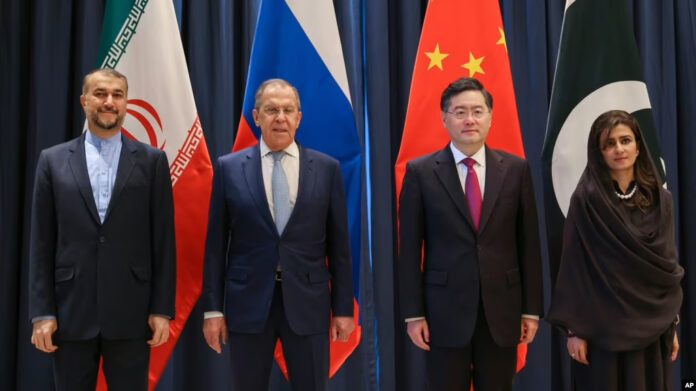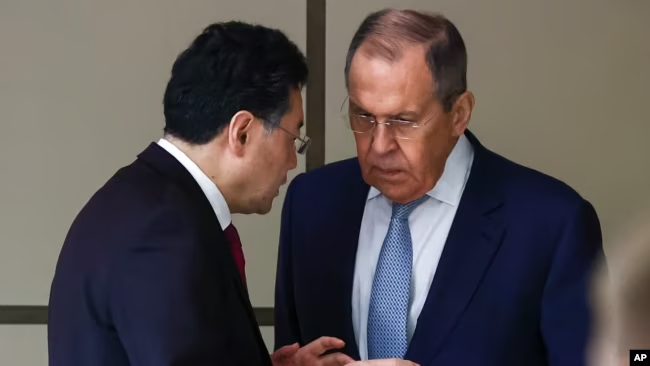
WASHINGTON — A gathering of regional foreign ministers to discuss the way forward in Afghanistan this week brought little in the way of new initiatives but provided a forum for several of Kabul’s neighbors to blame the country’s economic plight on the United States and its Western allies.
The United States “was portrayed as an irresponsible actor, which for two decades destroyed Afghanistan and now refuses to cover the damage,” said a Central Asian diplomat who described to VOA the general mood at the Samarkand meeting hosted by Uzbekistan and attended by representatives of Afghanistan, China, Russia, Iran, Pakistan, Tajikistan and Turkmenistan. The diplomat spoke on condition of anonymity.
That message was reflected on the Russian Foreign Ministry’s Telegram channel, which said the participants “emphasized that the U.S. and its NATO allies must be held accountable for the outcome of their 20-year military campaign, which brought Afghanistan to its current dire state.”
The foreign ministry stressed “the countries of the collective West should assume the main financial burden for the post-conflict reconstruction of Afghanistan.” Moscow also called to immediately unfreeze Afghanistan’s national assets held in Western institutions, saying that is “especially important for resolving the humanitarian crisis in that country.”
Russia cited “the unacceptability of the U.S. and NATO attempts to deploy their military infrastructure on the territory of the neighboring countries of Afghanistan.” The United States has sought a presence in the region to monitor and address threats from terrorist groups such as Islamic State.
Uzbekistan stresses need
Host Uzbekistan, in its own statement, avoided direct criticism of the United States but underscored the need for a joint mechanism to provide humanitarian assistance and restore Afghanistan’s economy.
It said the parties discussed the Taliban’s implementation of the international community’s main demands, “such as the creation of an inclusive government, the opportunity for Afghan women to work and receive education and ensuring the rights of the minorities.”
Uzbekistan considers Afghanistan an integral part of Central Asia and sees it as key to connecting Central and South Asia, opening commercial routes for landlocked country like itself.
“In this context, the parties spoke in favor of the implementation of infrastructure and socioeconomic projects in the territory of Afghanistan with the participation of neighboring states, which will contribute not only to the creation of new jobs but also to a more active integration of Afghanistan into regional economic processes,” Tashkent said.

Foreign ministers criticize West
No public comments were released by Turkmenistan, which has the longest Central Asian border with Afghanistan, or Tajikistan, which is supporting ethnic Tajiks in northern Afghanistan and is the only country in the region accepting Afghan refugees.
Displaying Tehran’s typical disdain for U.S. foreign policy, Iranian Foreign Minister Hussein Amir-Abdollahian said the West “should admit responsibility for decades of destruction in this country and compensate it. Afghanistan’s geography cannot be used as a leverage against the regional countries.”
Amir-Abdollahian also accused Washington of “supporting and guiding Daesh and other terrorist and extremist groups in the south and north of Afghanistan.” Daesh is another name for the Islamic State extremist group, which has claimed responsibility for terrorist attacks in Afghanistan both before and after the Taliban takeover.
Pakistan’s Minister of State Hina Rabbani Khar urged the international community to help the Afghan people, criticizing the West for “advocating a complete break from Afghanistan, to offload its problems to the neighborhood and to walk away.”
Western governments have in fact continued to contribute to relief efforts in Afghanistan while funneling that aid through international organizations rather than directly funding the Taliban administration. The United States alone says it has provided more than $1.1 billion in humanitarian assistance since August 2021.
The United Nations also has almost 4,000 employees working in Afghanistan mainly on relief efforts, although it recently suspended operations after the Taliban issued an order banning its female Afghan employees from working.
Islamabad’s envoy warned of declining humanitarian support for Afghanistan and said it is time to re-assess policies that question the utility of engaging the interim Afghan government.
‘The U.S. should not sit back’
Ahead of the forum, Beijing declared its readiness to work with the countries around Afghanistan as well as the international community to help the struggling nation, calling on the Biden administration “to live up to its commitments” in Afghanistan.
Following the conference, Chinese Foreign Minister Qin Gang told reporters the U.S. withdrawal from Afghanistan was a multifold strategic failure.
Echoing China’s oft-repeated grievances with Washington, Qin charged that the 20-year U.S. military presence did not bring peace to Afghanistan, and the West’s attempt to affect a “democratic transformation” of the country did not fit local conditions.
Qin also demanded the return of Afghanistan’s $7 billion in financial reserves that the United States froze in New York immediately after the Taliban seized power last year. President Joe Biden later authorized the release of half of the reserves and left the rest for 9/11 victims to pursue through ongoing litigation.
“The U.S. should not sit back and ignore the current plight of the Afghan people, and their hard-earned money forcibly seized by the U.S. must be returned as soon as possible,” the Chinese envoy said.
Hope, human rights
In a joint Samarkand Declaration issued Friday, Afghanistan’s neighbors and Russia reaffirmed their commitment to the development of Afghanistan “as a peaceful, united, sovereign and independent state, free from the threats of terrorism and drug trafficking.”
Underlining the prerequisite for a government reflecting the interests of all segments of the Afghan society, the parties noted the terrorism-related situation remained severe with several extremist groups “still based in Afghanistan” and threatening regional and global security.
These groups were listed as the Islamic State of Iraq and the Levant, Al-Qaeda, the Eastern Turkistan Islamic Movement, the Tehreek-e-Taliban Pakistan, the Balochistan Liberation Army, Jundallah, Jaish al-Adl, Jamaat Ansarullah and the Islamic Movement of Uzbekistan.
The declaration said the international community must communicate with Afghanistan and expressed hope that the United Nations will continue its humanitarian assistance to the country, while calling on the Taliban to respect human rights, including those of all ethnic groups and women.
The attendees cheered Uzbekistan’s proposal to launch a U.N.-led negotiation group and Tajikistan’s initiative to create a “security belt” around Afghanistan.
Speaking at a recent policy seminar in Washington, Gavin Helf of the U.S. Institute of Peace said American policy-makers and thinkers “are still very confused about how to respond” to the challenges in Afghanistan.
“Are we for helping the Taliban to get humanitarian support or do we want to see regime change?” he asked at the event sponsored by the George Washington University’s Central Asia Program. “We don’t yet have any answers to these questions in terms of policy.”
As a result, Helf said, the Central Asians have begun to address the situation “from a position of their own agency, trying to take the lead.”
“Is the best way to deal with your neighbor as the Taliban engagement, looking for evolution or is it containment? Or is it confrontation?”
Helf’s questions were partly answered by the visiting Uzbek delegation last week, which touted Tashkent’s dialogue with the Taliban as not advocacy or support of this group but an effort to prevent the situation in Afghanistan from getting worse.
Courtesy: VOA



